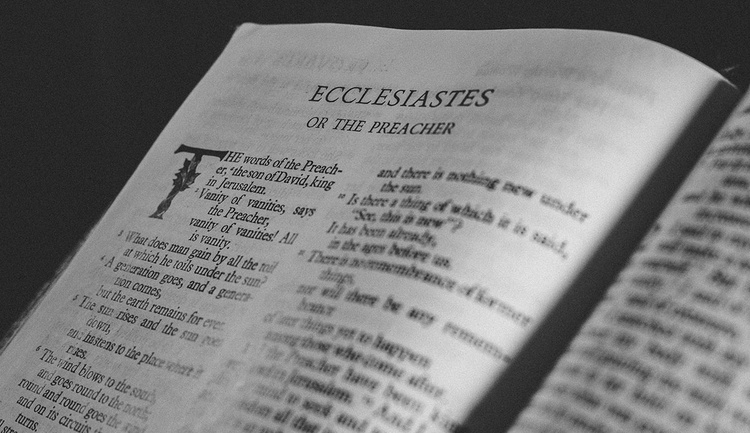Question from a reader:
Ecclesiastes 9:10 says, “Whatever your hand finds to do, do it with your might, for there is no work or thought or knowledge or wisdom in Sheol, to which you are going.” This is in stark contrast to what I see throughout the rest of the Bible. In fact, this verse seems to say that both sinners and the righteous go to the same place! The one answer I have found to this was that Jesus had not yet revealed the resurrection when this was written, but that doesn’t line up with the many references to the resurrection found in the Old Testament, including the most obvious reference in Job 19:26. I must not be understanding what this verse is saying, for it seems to go against a large portion of the Bible.
Answer from Stephanie Anderson, EPM staff:
The book of Ecclesiastes certainly can be tricky to interpret. Taken by themselves, some verses seem to say completely contradictory things!
For example, Randy has been asked about 9:5, which says, “the dead know nothing.”
He writes, “Some Old Testament passages (e.g., Ecclesiastes 9:5) address outward appearances and do not reflect the fullness of New Testament revelation concerning immediate relocation and consciousness after death.”
About verse 10: we know from further biblical revelation that those who are dead are with Christ, because to be absent from the body is to be present with the Lord (2 Corinthians 5:8). Christ is the wisdom of God (1 Corinthians 1:24) and the source of all knowledge; “all the treasures of wisdom and knowledge” are hidden in Him (Colossians 2:3). Obviously, being in His presence will mean the fullness of those things, not the absence of them!
Revelation gives us a peek into life in the present Heaven, and we know that there are indeed knowledge, planning, and wisdom there (see Randy’s article). And finally, we are given a preview of our life on the New Earth, the eternal Heaven, in Revelation 21-22. Revelation 22: 3 tells us, “His servants will serve Him.” This is not a picture of people who know nothing; serving Him will require wisdom, knowledge, and planning!
(You mentioned that this verse seems to say both sinners and the righteous go to the same place: “…in Sheol, to which you are going.” Randy writes, “Sheol is not hell; to the Hebrew mind it is death; a place where the soul waits for resurrection and judgment.” So yes, we all die and our bodies enter the grave, but at death the conscious part of us either enters Christ’s presence or goes to hell.)
Got Questions explains this about Ecclesiastes (specifically addressing 9:5). I think it helps also explain verse 10:
The key to understanding the statement “the dead know nothing” is found in the theme of the book of Ecclesiastes. Ecclesiastes is written specifically from an earthly perspective. The key phrase, repeated throughout the book, is under the sun, used about thirty times. Solomon is commenting on an earth-bound life, “under the sun,” without God. His conclusion, also repeated throughout the book, is that everything from that perspective is “vanity” or emptiness (Ecclesiastes 1:2).
When a person dies “under the sun,” the earthly perspective, without God, is that it’s over. He is no longer under the sun. There is no more knowledge to give or be given, just a grave to mark his remains. Those who have died have “no further reward” in this life; they no longer have the ability to enjoy life like those who are living. Eventually, “even their name is forgotten” (Ecclesiastes 9:5).
It helps to remember the genre of Ecclesiastes (wisdom literature) and the author’s purpose in writing (to show the futility of seeking happiness in worldly things; of living with a perspective limited to only this present life). That’s why understanding how this book fits in the overall biblical narrative is important.
Here is a helpful overview of the book of Ecclesiastes. They write, “Ecclesiastes offers the Christian an opportunity to understand the emptiness and despair that those who do not know God grapple with. Those who do not have a saving faith in Christ are faced with a life that will ultimately end and become irrelevant.”
I also recommend the book overview video from the Bible Project.
Happy studying!
Photo: Unsplash




